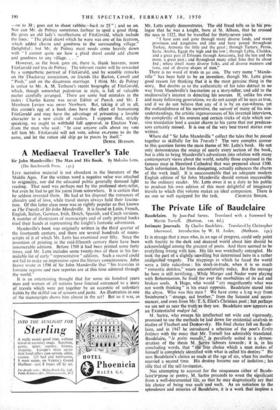A Mediaeval Traveller's Tale
Sir John Mandeville: The Man and His Book. By Malcolm Letts.
(The Batchworth Press. is.)
LIVE narrative material is not abundant in the literature of the Middle Ages. For the written word a negative value was attached to originality, nor did the educated public generally demand light reading. That need was perhaps met by the professed story-teller, but even he had to get his yarns from somewhere. It is certain that he seldom invented them. He had at his disposal the romances of chivalry and of love, while travel stories always held their fascina- tion. Of this latter class none was so rightly popular as that known as The Travels of Sir John Mandeville. It is found in Latin, French, English, Italian, German, Irish, Dutch, Spanish, and Czech versions. A number of illustrators of manuscripts and of early printed books tried their hands at representing the knight's fantastic adventures.
Mandeville's book was originally written. in the third quarter of the fourteenth century, and there are several hundreds of manu- scripts of it of which Mr. Letts has examined over fifty. Since the invention of printing in the mid-fifteenth century there have been innumerable editions. Before 1500 it had been printed some forty times, and Mr. Letts includes some twenty-two of these in his for- midable list of early " representative " editions. Such a record could not fail to make an impression upon the literary consciousness. John Stowe wrote in 1598 of Sir John Mandeville that " his traveyles in forraine regions and rare reportes are at this time admired through the world."
It is an entertaining thought that for some six hundred years men and women of all nations have listened entranced to a story of travels which were put together by an eccentric of sedentary habits by the skilful use of scissors and paste. An illustration in one of the manuscripts shows him almost in the act! But so it was, as
Mr. Letts amply demonstrates. The old fraud tells us in hiS pro- logue that he was a knight, born at St. Albans, that he crossed the seas in 1322, that he travelled for thirty-seven years.
" I have seen and gone through many diverse lands, and many provinces and kingdoms and isles and have passed throughout Turkey, Armenia the little and the great ; through Tartary, Persia, Syria, Arabia, Egypt the high and the low ; through Lybia, Chaldea, and a great part of Ethiopia through Amazonia, Ind the less and the more, a great part ; and throughout many other Isles that be about Ind ; where dwell many diverse folks, and of diverse manners and laws, and of diverse shapes of men."
There is no word of trutn in an tni& The very name " Mande- ville " has been held to be an invention, though Mr. Letts gives good reason for thinking that it is the most genuine thing in the story. But doubts as to the authenticity of his tales detract in no way from Mandeville's fascination as a story-teller, and add to the mediaevalist's interest in detecting his sources. If, unlike his own and many following generations, we do not accept all he says as true, and if we do not believe that any of it is by an eye-witness, yet the outlandishness of his narrative, the naiveté of many of his mis- understandings, the artistic ingenuousness of his invented interviews, the complexity of his sources and certain tricks of style which sur- vive translation lend a quaint charm to his yarns that our predeces- sors certainly missed. It is one of the very best travel stories ever written.
Where did " Sir John Mandeville " collect the tales that he pieced together so skilfully for his Travels? The very complex answer to this question forms the main theme of Mr. Letts's book. He not only demonstrates the source of nearly every' section of the book, but is able to bring Mandeville's adventures into relation with many contemporary views about the world, notably those expressed in the famous map in Hereford Cathedral that was prepared about 1300. Such information, far from dissipating, actually enhances the charm of the work itself. It is unaccountable that an adequate modern English edition of Sir John Mandeville should remain inaccessible to the ordinary reader. Mr. Letts owes it as a duty to his public to produce his own edition of this most delightful of imaginary travels to which this volume makes an ideal companion. There is no one so well equipped for the task. CHARLES SINGER.


































 Previous page
Previous page